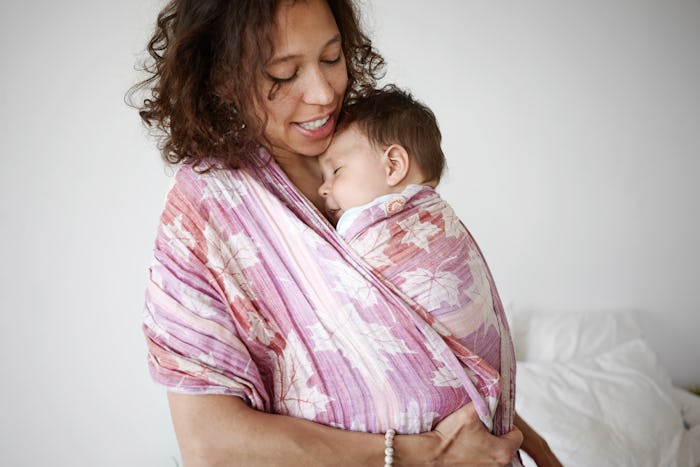Life

It's Black Babywearing Week, & Here's Why This Celebration & Awareness Is Important
Now more than ever, parents are looking to connect with their child on a deep level to assure their baby grows with a close sense of connection with their parent. Babywearing can provide this in abundance, which is one of the reasons why Black Babywearing Week is so important, and why it must be celebrated.
Black Babywearing Week is happening right now, and during the current climate of radical racial justice, it feels more apt than ever. History has shown examples of babywearing throughout every culture and region, but as did so many things, the practice fell out of favor in Western Europe during the Industrial Revolution, when strollers and cribs took their place. However, babywearing remained a popular method of traveling and bonding with infants and toddlers throughout the rest of the world. Black Babywearing Week seeks to amplify the bonding power and celebrate the beauty of babywearing in a community often driven away from it by the very people who were westernizing the practice, and placing it in a position of cultural zeitgeist that removed its connection to those who never abandoned it.
Doula Deyonna Phillips tells Romper that Black Babywearing Week is essential because if the practice is lost, there is no telling if it will be found again. "Babywearing has played a major part in the African culture for centuries. It has been passed down from generation to generation," she says. "Babywearing promotes a sense of mental recovery for my clients and helps them to adapt to the idea that they can still do the things they were doing before the baby, just 'wearing the baby.'"And on a side note, you learn that babies can sleep through the weirdest things — train rides, baseball games, gardening, whatever.
But the benefits aren't only for the baby, or to serve as a convenience for the caregiver. Phillips says that postpartum depression is very prominent in the community of Black mothers, but not addressed enough. Studies have also found that Black mothers are less likely to receive treatment for postpartum depression. But Phillips believes that babywearing is a postpartum depression prevention, and also part of a solution. "Babywearing allows the mother to feel strong and able while still bonding with the baby by being physically attached."
Black Babywearing Week allows Black mothers to connect with these ideas in new ways as they are highlighted in social media, events, and across platforms. Raye Thomas, a doula and breastfeeding specialist with Robyn, tells Romper that the week "was founded by a group that saw a need for representation for Black people in the babywearing space. We didn’t see ourselves in ads and online. When you clicked the babywearing hashtag, you didn’t see us. Black Babywearing Week serves as a time to celebrate Black babywearers, while spotlighting Black educators, bloggers and Black-owned babywearing companies.
"Although there was a time in our history when Black caregivers feared getting 'too attached' to their babies, just in case they were ripped apart, we are here now, babywearing proudly, as it's our birthright," Thomas says. She believes that the Black babywearing community is "bringing light to our history, honoring the way our ancestors wore babies, and embracing our future. This is why Black Babywearing Week is important."
Family medical practitioner Dr. Omerine Aseh, MD, originally from Cameroon, West Africa tells Romper why the week is important to her, too. “We must encourage this age-old tradition. From the age of one month, I carried my babies on my back. When you carry a child on your back, you create a bond with that child. It is a tradition that I am honored to teach and should never be forgotten."
And it's definitely one worth celebrating.